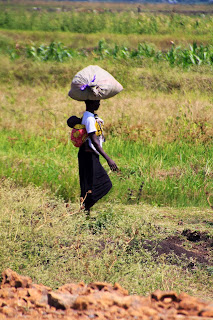
It is appropriate that on National Cancer Day we are able to provide cervical cancer screening and training to the women of Nyabondo, in the region of the Luo tribe. The overall rate of HIV in Kenya is 4%, but here the rate is 15%. This is due to early age of intercourse (13-15 for girls), polygamy and poor nutrition. 5/6 women we interviewed yesterday were HIV positive, all of them on meds and appeared healthy. Being HIV positive makes a woman much more likely to have cervical cancer, as her immune system is weaker and unable to protect her from the HPV virus that causes cervical cancer. The program we are providing to teach medical personall how to perform the screening will be immensely helpful to the area woman as intervention can be provided early on in the disease process. The 8 nurses/physicians that attended the lecture yesterday were very enthusiastic about the program and eager to learn. They return today as we screen 15 more women and teach as we do the screenings.
Getting here by car from Bogamo yesterday was an adventure - as are most trips in Kenya. Part of the road was under construction and we were driving on a bumpy sideroad next to the very smooth, partially completed paved road. Although we were not allowed to drive on the road, it was a perfect smooth pathway for the area cows, goats and motorcycles. Our driver stopped in the middle of the congested, dusty road - or so I thought! The car had just quit and couldn't be restarted. A passing motorcyclist called his friend, a car mechanic , and brought him back to our car within 5 mins. After taking apart the steering column, glove box and under the hood, he determined that we needed a new fuse. We found this in town, replaced the old fuse and were on our way in under an hour. During our delay I was able to get some great pictures of the passing traffic, both animal and human. Not a wasted time at all.
The woman that I have been working with this week are all incredibly interesting and well traveled. Talking with them in the 4 hour car trip yesterday was much better than reading a book on public health and more informative. I will miss them immensely by the end of the week, but hope to travel with them again in the future. This program, PINCC, is so necessary both from the standpoint of the actual screening but also due to the education that we are providing to both the students and the patients.


No comments:
Post a Comment